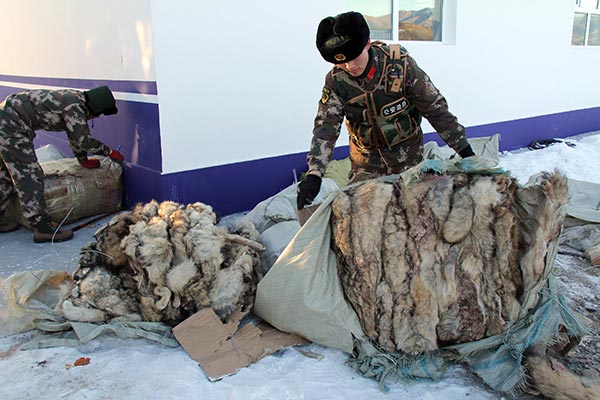
Border patrol officers at Altay, Xinjiang, examine a batch of wolf skin which was smuggled into the country.[Photo/Xinhua]
China has pledged to enhance its protection of wildlife species in the next five years, especially those endangered by threats of poaching and fragmented habitat, including the giant panda, African elephant and Siberian tiger.
“Protection of wildlife specifies will be included in the 13th Five-Year-Plan (2016-20),” Meng Xianlin, director of the Endangered Species of Wild Fauna and Flora Import and Export Management Office, said on March 3, World Wildlife Day.
“We will start special protection projects for giant panda, Siberian tigers, African elephants, and carry out protection for critically endangered animals such as the snow leopard,” said Meng. “We will also curtail ivory smuggling as well as tighten regulations on wildlife imports and exports.”
Despite improvements with wildlife populations in some countries, many species such as Asian elephants, cheetahs, pangolins, rhinos, sea turtles, tigers and whales face a variety of different challenges, including from habitat change, over-exploitation or illicit trafficking.
According to China’s Forest Police, it dealt with 3,319 cases of illegal hunting and setting traps for wildlife in 2015, an increase of 24.2 percent compared with the previous year. These cases have led to the loss of 130,973 wild animals.
Meng said there have been other emerging threats such as the illegal online trade of wildlife and related products.
“We are considering drafting a standard of posting wildlife information online along with Internet giants including Alibaba and Tencent to curb illegal online trading,” added Meng.
During the two sessions, NPC delegates and CPPCC members also gave their attention to wildlife protection work.
He Yicheng, an NPC Standing Committee member, said protection responsibilities should not only be shouldered by local governments, and the central government should fiscally support them.
“The major tasks of wildlife protection are scattered around regions including Tibet, Jilin, Yunnan, Shaanxi, Gansu and Qinghai. The majority of them are still facing poverty issues,” said He.
Another NPC delegate, Zhang Mingqi, said protection of wildlife should mobilize social forces.
“We should encourage and welcome the public, private companies and social groups to participate in the protection work by donating money or establishing foundations,” said Zhang.
“We will also open more channels for them to get involved.”
